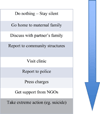Responses to and resources for intimate partner violence: qualitative findings from women, men, and service providers in rural Kenya
- PMID: 24255067
- PMCID: PMC3910289
- DOI: 10.1177/0886260513505706
Responses to and resources for intimate partner violence: qualitative findings from women, men, and service providers in rural Kenya
Abstract
Intimate partner violence (IPV) is reported by one in three women globally, but the prevalence is much higher in East Africa. Though some formal and informal resources do exist for women experiencing IPV, data suggest that disclosure, help seeking, and subsequent utilization of these resources are often hindered by sociocultural, economic, and institutional factors. This article explores actions taken by victims, available support services, and barriers to the utilization of available IPV resources by pregnant women in rural Nyanza, Kenya. Qualitative data were collected through nine focus group discussions and 20 in-depth interviews with pregnant women, partners or male relatives of pregnant women, and service providers. Data were managed in NVivo 8 using a descriptive analytical approach that harnessed thematic content coding and in-depth grounded analysis. We found that while formal resources for IPV were scarce, women utilized many informal resources (family, pastors, local leaders) as well as the health facility. In rare occasions, women escalated their response to formal services (police, judiciary). The community was sometimes responsive to women experiencing IPV but often viewed it as a "normal" part of local culture. Further barriers to women accessing services included logistical challenges and providers who were undertrained or uncommitted to responding to IPV appropriately. Moreover, the very sanctions meant to address violence (such as fines or jail) were often inhibiting for women who depended on their partners for financial resources. The results suggest that future IPV interventions should address community views around IPV and build upon locally available resources-including the health clinic-to address violence among women of childbearing age.
Keywords: Kenya; disclosure of domestic violence; domestic violence in cultural contexts; support seeking.
Conflict of interest statement
The authors declared no potential conflicts of interest with respect to the research, authorship, and/or publication of this article.
Figures
Similar articles
-
Needs and unmet needs for support services for recently pregnant intimate partner violence survivors in Ethiopia during the COVID-19 pandemic.BMC Public Health. 2023 Apr 20;23(1):725. doi: 10.1186/s12889-023-15634-7. BMC Public Health. 2023. PMID: 37081421 Free PMC article.
-
Willing but Not Able: Patient and Provider Receptiveness to Addressing Intimate Partner Violence in Johannesburg Antenatal Clinics.J Interpers Violence. 2019 Apr;34(7):1331-1356. doi: 10.1177/0886260516651094. Epub 2016 May 22. J Interpers Violence. 2019. PMID: 27215666
-
"Being Married Doesn't Mean You Have to Reach the End of the World": Safety Planning With Intimate Partner Violence Survivors and Service Providers in Three Urban Informal Settlements in Nairobi, Kenya.J Interpers Violence. 2021 Oct;36(19-20):NP10979-NP11005. doi: 10.1177/0886260519879237. Epub 2019 Oct 5. J Interpers Violence. 2021. PMID: 31587653
-
Intimate Partner Violence and the Rural-Urban-Suburban Divide: Myth or Reality? A Critical Review of the Literature.Trauma Violence Abuse. 2015 Jul;16(3):359-73. doi: 10.1177/1524838014557289. Epub 2014 Dec 4. Trauma Violence Abuse. 2015. PMID: 25477015 Review.
-
Intimate partner violence screening and treatment: the importance of nursing caring behaviors.J Forensic Nurs. 2006 Winter;2(4):184-8. doi: 10.1111/j.1939-3938.2006.tb00080.x. J Forensic Nurs. 2006. PMID: 17228508 Review.
Cited by
-
Ethiopian Health Care Workers' Insights into and Responses to Intimate Partner Violence in Pregnancy-A Qualitative Study.Int J Environ Res Public Health. 2020 May 25;17(10):3745. doi: 10.3390/ijerph17103745. Int J Environ Res Public Health. 2020. PMID: 32466276 Free PMC article.
-
Missed treatment opportunities and barriers to comprehensive treatment for sexual violence survivors in Kenya: a mixed methods study.BMC Public Health. 2018 Jun 19;18(1):769. doi: 10.1186/s12889-018-5681-5. BMC Public Health. 2018. PMID: 29921257 Free PMC article.
-
Intimate Partner Violence and HIV Outcomes Among Women Living with HIV in Durban, South Africa.AIDS Behav. 2024 Jul;28(7):2247-2257. doi: 10.1007/s10461-024-04318-x. Epub 2024 Jun 13. AIDS Behav. 2024. PMID: 38869756 Free PMC article.
-
Intimate partner violence and postpartum healthcare access in Kenya: a cross-sectional study.BMC Pregnancy Childbirth. 2024 Feb 26;24(1):168. doi: 10.1186/s12884-024-06342-0. BMC Pregnancy Childbirth. 2024. PMID: 38409006 Free PMC article.
-
Integrating Gender-Based Violence Screening and Support into the Research Clinic Setting: Experiences from an HIV Prevention Open-Label Extension Trial in Sub-Saharan Africa.AIDS Behav. 2023 Apr;27(4):1277-1286. doi: 10.1007/s10461-022-03864-6. Epub 2022 Sep 30. AIDS Behav. 2023. PMID: 36178556 Free PMC article.
References
-
- Abramsky T, Devries K, Kiss L, Francisco L, Nakuti J, Musuya T, Kyegombe N, Starmann E, Kaye D, Michau L, Watts C. A community mobilisation intervention to prevent violence against women and reduce HIV/AIDS risk in Kampala, Uganda (the SASA! Study): study protocol for a cluster randomised controlled trial. Trials. 2012;13(1):96. - PMC - PubMed
-
- Ahrens CE, Campbell R, Ternier, ÄêThames NK, Wasco SM, Sefl T. Deciding whom to tell: Expectations and outcomes of rape survivors' first disclosures. Psychology of Women Quarterly. 2007;31(1):38–49.
-
- Ahrens CE, Rios-Mandel LC, Isas L, del Carmen Lopez M. Talking about interpersonal violence: Cultural influences on Latinas' identification and disclosure of sexual assault and intimate partner violence. Psychological Trauma: Theory, Research, Practice, and Policy. 2010;2(4):284.
-
- Central Bureau of Statistics (CBS) [Kenya], M. o. H. M. K., ORC Macro. Kenya Demographic & Health Survey 2008–2009. Calverton, Maryland: KNBS and ICF Macro; 2010.
-
- Clark CJ, Silverman JG, Shahrouri M, Everson-Rose S, Groce N. The role of the extended family in women's risk of intimate partner violence in Jordan. Social Science & Medicine. 2010;70(1):144–151. - PubMed
MeSH terms
Grants and funding
LinkOut - more resources
Full Text Sources
Other Literature Sources
Medical


